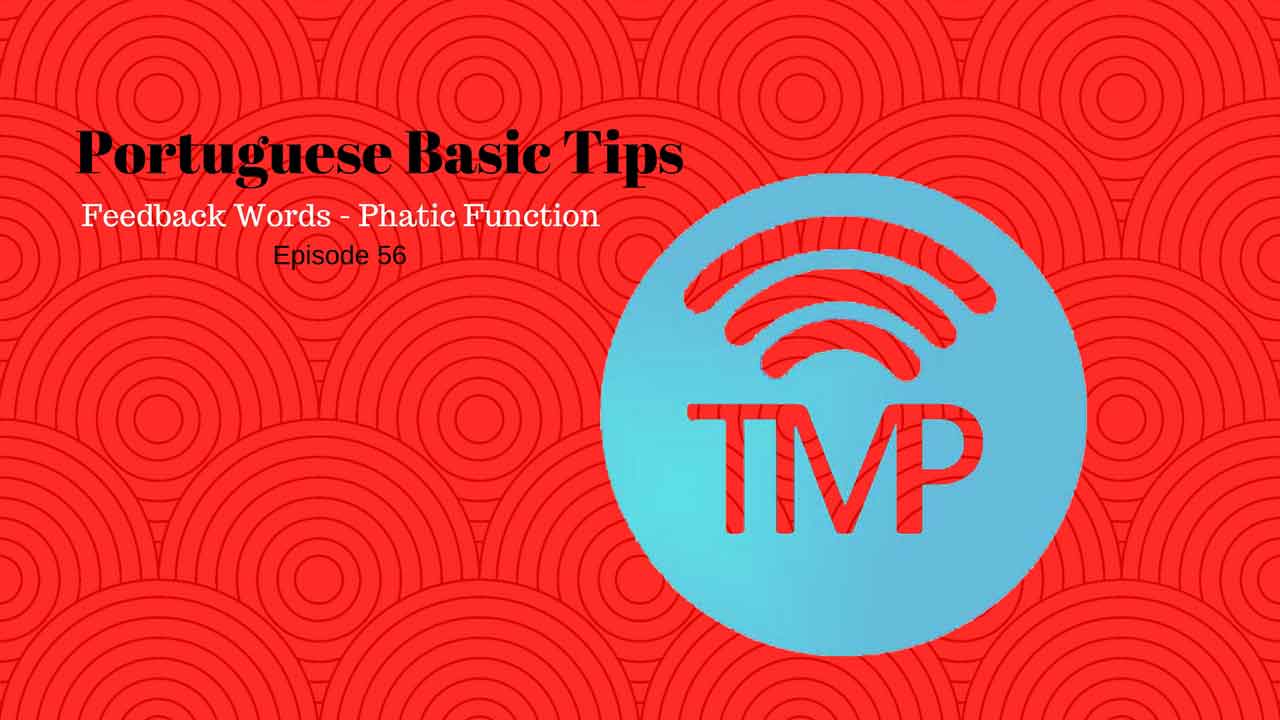Phatic function in Portuguese – Feedback words in Portuguese

Portuguese phatic function – Language functions in Portuguese
Phatic function in Portuguese. Feedback words in Portuguese
Well, there is this guy, a Russian guy called Roman Jakobson. He organized 6 constitutive elements of verbal communication and he called them “language functions”. Maybe you’ve heard of them somewhere.
Click on the link to visit our previous episodes about the verbs haver and existir in Portuguese
He believes that when we are in a conversation, the language splits into six different functions – each one of them plays a particular role in this scenario, but I don’t want this podcast turns into a complicated thing. As a matter of fact, this episode will be pretty simple to understand. Today we will speak of one of these language functions: the phatic function – função fática.
The phatic function keeps the communication open. This is used to make sure the other person is listening to us, the other person is following what we are saying at that moment.
For instance, listen to this sentence:
- Today we are going to speak about the phatic function of language, all right?
When I said “all right”, I wasn’t really asking if you are doing well, I wasn’t really asking if you are feeling good. Actually, I was trying, implicitly, to make a deal with you. I was trying to keep this channel opened.
Another way to use the phatic function is, for instance, when you are telling someone a story and he goes “well”, “hum”, “interesting”. He keeps the channel opened, as if he was saying “yeah, I’m listening to you, I’m following you”.
- Marcos, but what does this have to do with the Portuguese language?
- Well, I think this has to do with all kinds of languages, Sarah.
On today’s podcast, I will speak about ways of using função fática, in Portuguese.
Phatic function by the telephone
Formal way
We normally answer the call by saying “alô”.
Example:
- Alô, tudo bem?
The other person could say something as “você está me ouvindo bem?” meaning “can you hear me?”
Informal way – Feedback words in Portuguese
Nowadays, because of the technology, we normally know who is calling us even before answering the phone calling, right? If the person calling you is a friend, you could say something as “E aí, o que pega?”, meaning “hey, man! What’s up?”.
Greeting people
- Olá, como vai? Olá, tudo bem com você?
These are formal ways of greeting people here. We could translate that as “How are you doing?” or “How’s it going?”
If you want to be more informal, you could say “E aí, certinho?” or “E aí, beleza?” or even “E aí, tranquilo?”.
You could understand them as “sup”. I mean, they are just greetings. The guy who’s asking you is not really interested if you are “tranquilo” in fact.
Phatic function in the middle of the conversation
You know, here in Brazil, even when it’s our turn to listen to what the other person is talking about, we usually send him a few signals that we are following what he is saying, in order to keep this conversation channel opened.
We use things like “great”, “interesting”, “cool”, “aham”.
For instance, let’s simulate a conversation here.
- Você sabia que tenho um novo cachorro? (Do you know I have a new dog?)
- Que legal! (That’s great!)
- Sim, eu consegui convencer a minha mulher a de que deveríamos ficar com ele! (Yeah! I convinced my wife that we should take him).
- Uhum!
- Ela não gostava muito de animais. Agora, está amando o cachorro. (She didn’t like animals very much and now she’s in love with the dog).
- Interessante! (Interesting)
- Você deveria ir lá em casa para ver o bicho. Acho que ele vai gostar de você. (You should come over and see the dog. I think he’ll like you)
- Bom saber. Eu vou, assim que puder. (It’s good to know. I’ll go as soon as I can.)
Now, let’s try this conversation using informal funções fáticas.
- Você sabia que tenho um novo cachorro? (Do you know I have a new dog?)
Que da hora! (Da hora is a slang that is pretty much used in São Paulo meaning “cool”, “great”)
- Sim, eu consegui convencer a minha mulher a de que deveríamos ficar com ele! (Yeah! I convinced my wife that we should take him).
- Só! (The word “só” means “somente”, apenas (only) but in this case, it is used as a very informal slang. Its function here is “somente” to keep the conversation working)
- Ela não gostava muito de animais. Agora, está amando o cachorro. (She didn’t like animals very much and now she’s in love with the dog).
- Tô ligado. (This is another slang. In this case, tô ligado means “I know how it is”…)
- Você deveria ir lá em casa para ver o bicho. Acho que ele vai gostar de você. (You should come over and see the dog. I think he’ll like you)
- Pode crer. Eu vou assim que puder. ( the original meaning of the sentence “pode crer” would be “you can believe it”, but it turns out it became a slang that is used to show that you agree with what is being said. Pode crer, in this case means something as “you are right”).
Ways to say goodbye in Portuguese – Phatic Function
- Bem, estou indo embora! Até amanhã! (Or “até a próxima!) (Well, I’m leaving. See you later!)
- Até amanhã! Abraços! (See you later. And the other person simply says “até”, meaning “later”).
The curious thing here is that one wishes that the other one be “embraced” by saying “abraços”, but note that they are in a conversation, they side by side and could simply embrace each other, but they prefer to say that instead! This is very common here in Brazil: you could finish an email by texting “abraços” or even a real conversation as I said.
You could also use “vou nessa” as an informal way to announce you are leaving.
- Vou nessa. Falou! ( This is something like “I gotta go. See ya!)
Become a Premium Member to download our full transcripts
Click on the link and keep studying about the language functions in Portuguese
Valeu, vou nessa!
I hope you like it.
Abraços!
Marcos Sales
Podcast (portuguesebasictips): Play in new window | Download







1 Response
[…] Visite nosso episódio sobre função fática em português […]